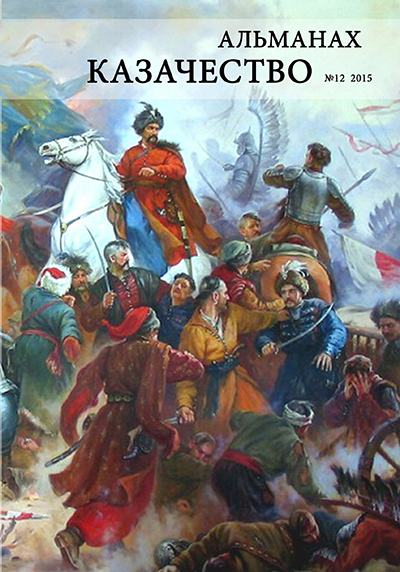Content
| Geopolitics and patriotic education | |
| Smirnov A.A. Interview "The Cossack Party of the Russian Federation" | 7 |
| History | |
| Erokhin I.U. Cossack maritime history: unknown pages of life of the ethnos | 20 |
| Galaganova S.G. Nikolay Turoverov and Alexander Block: formal adoptation or fundamental interaction? | 25 |
| Ryabova E.L. Cossacks in the XVII - XVIII centuries. Part 1. | 32 |
| Culture of the Cossacks and the national language | |
| Basuk S.V. Education of a citizen in a multicultural pluralism | 43 |
| II International Scientific Conference "Russia and China: history and prospects for cooperation in the global world" |
54 |
| The first Cossack university. The first graduates received diplomas | 56 |
| Abstracts | 60 |
| Authors | 62 |
Abstracts
Erokhin I.U.
Cossack maritime history: unknown pages of life of the ethnos
Maritime history of the Cossacks is an integral part of the state and ethnic Cossack history, important enough part. Unfortunately, this perspective, unlike the steppe border issues and frontier practices of Cossack, are not enough reflected in the scientific literature. This article is an attempt to correct this unfortunate omission, to look at the history of the Cossacks in a more holistic and full way.
Keywords: Cossacks, sea state, ethnicity, tradition, war, Russia, hiking, society, culture.
Galaganova S.G.
Nikolay Turoverov and Alexander Block: formal adoptation or fundamental interaction?
The verse of Nikolay Turoverov, a well-known Cossack poet in exile, is argued to be fundamentally influenced by Alexander Block’s poetry both in poetical form and sociocultural content.
Keywords: Nikolay Turoverov, the Don Cossacks, Russian Cossack culture, Russian poets in exile, Alexander Block, Kulikovo Battle Field, Scythians.
Basuk S.V.
Education of a citizen in a multicultural pluralism
The article analyzes the theory and practice of civic education in a changing global world.
One of the main trends in the era of postindustrialism is global cosmopolitanism, which leads to the migration of human capital, increased mobility of the younger generation and multicultural dissonance. Currently, a certain part of the Russian youth is actively engaged in tourism, takes part in the volunteer movement, academic exchange programs with foreign countries, communicates with their peers in foreign languages directly and in social networks of the Internet, and performs research projects in international target audiences.
Accordingly, the expansion of the cognitive horizon, cultural horizons, the overcoming of information and communication barriers, acquaintance with the world civil-legal and political systems, the world outlook and values of the inhabitants of different states is intensified more intensively.
The logical reaction of society and the entire Russian state to the changing realities should be the emergence of a harmonious pedagogical system through the implementation of which a multidimensional «portrait» of young people will be formed, striving for an unknown universal human future. At the same time, they must act as bearers of Russian identity, patriotism and a high culture of citizenship.
Keywords: multicultural pluralism, academic exchanges, youth migration, ethnicity resources, civic education, information and communication technologies, civic education, general education organizations, personal qualities.
Authors
Basuk S.V., Candidate of Pedagogical Sciences, teacher of the Bashkir Institute of Social Technologies.
Galaganova S.G., Candidate of Philosophy, Associate Professor of the Department «Political Science», Bauman Moscow State Technical University.
Erokhin I.U., Candidate of Historical Sciences, Senior Researcher, Croydon College, London, Great Britain.
Ryabova E.L., Doctor of political sciences, Professor, Chief Editor of “Etnosotsium” international publishing house.
Smirnov A.A., Major-General, Candidate of Historical Sciences.



